|
|
|
Sort Order |
|
|
|
Items / Page
|
|
|
|
|
|
|
| Srl | Item |
| 1 |
ID:
183930
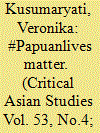

|
|
|
|
|
| Summary/Abstract |
After the brutal killing of George Floyd sparked antiracism protests worldwide, Black youth organized protests in West Papua, Indonesia’s marginalized and easternmost region. In 2019, Papuans protested against entrenched racism in Indonesian society, when Papuan students in Java were subjected to racist epithets. Since then, Papuans have used the hashtag #Papuanlivesmatter to articulate their connection with broader antiracism protests across the world and bring the Papuan experience to #BlackLivesMatter movements. While global Black political movements have long shaped Papuan identities, the new Papuan Lives Matter movement shows how digital media have played an influential role in the spread of antiracism protests and how Blackness has been understood and articulated, not only in relation to white supremacy but also to postcolonial claims of multiculturalism in Asian societies. This article discusses the specific context in which protests under Papuan Lives Matter emerged and its relationship with the global Black Lives Matter movements. This article also explores the idea of Blackness in West Papua that stems not only from the influence of and conversation with American Black political movements and African liberation movements but also lived experience as a Black people under Indonesian occupation.
|
|
|
|
|
|
|
|
|
|
|
|
|
|
|
|
| 2 |
ID:
183460
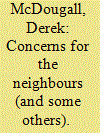

|
|
|
|
|
| Summary/Abstract |
Focusing on the conflicts in the Southern Philippines and West Papua, this article uses a framework developed from the literature on the internationalisation of ethnic conflict to suggest insights into international involvement in both conflicts. In both cases there are succinct overviews of the relevant general background to the conflict, and international involvement in particular, followed by a characterisation in terms of typological features that covers motives for involvement, objectives, means of involvement, and impact. Insights into international involvement in the two conflicts can suggest ways in which aspects of the general literature might be developed further, but two cases are insufficient to develop more broad ranging generalisations. A key insight is the way in which specifically political factors can affect the way in which motives for involvement manifest themselves, the significance of Sabah politics in relation to Malaysian involvement in the Southern Philippines, and West Papuan lobbying in the Melanesian countries being cases in point.
|
|
|
|
|
|
|
|
|
|
|
|
|
|
|
|
| 3 |
ID:
192944
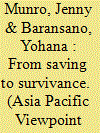

|
|
|
|
|
| Summary/Abstract |
Racism, sexism and gendered violence disadvantage Indigenous Papuan women, yet government responses often focus on individual interventions like ‘raising awareness’ or training. In this article, we build on efforts to challenge these narratives about women's vulnerabilities. We draw on life history interviews with older Papuan women in Jayapura to rethink vulnerabilities and everyday struggles in the context of structural inequalities. We interpret their stories as forms of ‘survivance’ and argue that contrary to dominant perspectives, Papuan women are not economic novices or passive victims. Rather, opportunities have narrowed over time, and women's long history of activity, strategy, persistence and resistance has largely been forgotten. Women's life histories shed light on urban colonialism and Indigenous survivance in Jayapura since the 1940s, when Jayapura was still a Dutch colonial capital and not yet an Indonesian frontier. In a time dominated by concerns about Papuan demise, their experiences are provocative for rethinking vulnerabilities.
|
|
|
|
|
|
|
|
|
|
|
|
|
|
|
|
| 4 |
ID:
183455


|
|
|
|
|
| Summary/Abstract |
The Westphalian system provides the global context of international relations within which the recent and contemporary ‘small wars and insurgencies’ of Maritime Southeast Asia have developed. Usually dated to the Peace of Westphalia in 1648, ending the Thirty Years’ War in Europe, the Westphalian system located sovereignty in states, following the principle of cuius regio, eius religio (whose realm, their religion). This system replaced arrangements where sovereignty was more mixed, leading at times to conflict over the location of authority.
|
|
|
|
|
|
|
|
|
|
|
|
|
|
|
|
| 5 |
ID:
193640
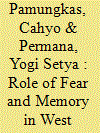

|
|
|
|
|
| Summary/Abstract |
In the West Papua conflict, fear fuels both Papuan ethnonationalist and Indonesian nationalist sentiment. We argue that this reciprocal fear and memoria passionis plays a significant role in fuelling political violence. On the one hand, it provokes Papuan activists to respond violently to Indonesian military operations. Fear of losing future generations of indigenous Papuans has strengthened their identity as Papuans and encouraged them to join armed movements against Indonesia. On the other hand, fear of West Papuan independence leads the Indonesian military and police to conduct operations against members of the Free Papua Movement and affiliated groups and other activists not in the independence movement. This results in a “reciprocal fear-fuelled nationalism,” whereby Indonesian security forces and Papuan separatist activists are drawn into increasing conflict. In this context, fear becomes institutionalized and socially constructed. By understanding the unending violent conflict in Tanah Papua as related to the transfer of emotions across generations, it becomes clear a military operations approach will not be effective in the long term. Non-violent approaches, especially dialogue with separatist groups, will be more effective in breaking the chain of violent memories, resulting in more positive outcomes for conflict resolution in Papua. Learning from negotiations between the government of Indonesia and the Free Aceh Movement in 2005, we support the proposition that dialogue is the best entry point by which to end this prolonged separatist armed conflict.
|
|
|
|
|
|
|
|
|
|
|
|
|
|
|
|
| 6 |
ID:
159158
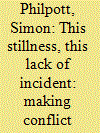

|
|
|
|
|
| Summary/Abstract |
This article examines how the ongoing conflict in West Papua between state security forces and Papuan independence activists is made visible in activist social media postings in their attempts to draw attention to the violence, abuses, and problems in Indonesia’s easternmost province. The use of social media may provide new avenues for raising awareness about the conflict and its consequences. However, a social media strategy that contrasts the innocence and justness of the Papuan people with the violence and barbarity of other Indonesian peoples and the state risks entrenching established tropes which may serve to discourage broader support for West Papuan pleas for justice and independence.
|
|
|
|
|
|
|
|
|
|
|
|
|
|
|
|
| 7 |
ID:
098235
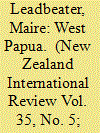

|
|
|
| 8 |
ID:
142227
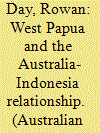

|
|
|
|
|
| Summary/Abstract |
This article is a study of West Papua's impact on the relationship between Australia and Indonesia. Its purpose is to enhance understanding of various diplomatic challenges emerging from West Papua, the origins of these challenges, and how they impact upon the relationship. This will be achieved through an analysis of a particular incident in 2006 in which 43 West Papuan refugees arrived in Australia. This led to a diplomatic storm between the Indonesian and Australian governments, and a highly charged public debate. Insights will be gleaned from the incident and its aftermath to broaden our understanding of West Papua's impact on the Australia-Indonesia relationship.
|
|
|
|
|
|
|
|
|
|
|
|
|
|
|
|
| 9 |
ID:
073030
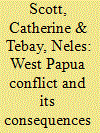

|
|
|
| 10 |
ID:
190655
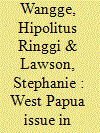

|
|
|
|
|
| Summary/Abstract |
Pacific island countries have paid increasing attention to the situation in Indonesia’s easternmost provinces of Papua and West Papua (commonly referred to collectively as West Papua) in recent years, prompted mainly by continuing human rights abuses as well as the more general political and economic marginalization of indigenous West Papuan people since integration with Indonesia in 1969. This article addresses some key questions concerning Indonesia’s failure to deal effectively with the issue. Against a background of reactionary hypernationalism on the one hand, and a rhetorical anti-colonial internationalism on the other, domestic policy with respect to the treatment of indigenous West Papuans has, for the most part, seen a continuation of repressive authoritarian measures. And in responding to international criticisms, foreign policy has been poorly handled. There has been a lack of serious engagement with human rights issues as reflected in ongoing denial of abuses in the provinces and a generally reactive and defensive foreign policy approach. At a bureaucratic level, there is little coordination between the Ministry of Foreign Affairs and other ministries with responsibilities for West Papua, and therefore no effective basis on which to build a coherent policy response. Another problem consists in Indonesia’s often clumsy public diplomacy in the Pacific islands region. As a consequence, the West Papua issue continues to grow in prominence in Pacific regional politics and beyond.
|
|
|
|
|
|
|
|
|
|
|
|
|
|
|
|
| 11 |
ID:
146527
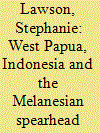

|
|
|
|
|
| Summary/Abstract |
The idea of a shared Melanesian identity has been consolidated over the last three decades or so through the most important subregional organisation in the South-West Pacific—the Melanesian Spearhead Group (MSG). The solidarity of this group has been strained over various issues from time to time, but none is as fraught as the Indonesian occupation of what is commonly known as West Papua, whose indigenous Papuan people are ethnically Melanesian. In addition to recounting the Indonesian takeover of West Papua in the context of the dynamics of decolonisation, the Cold War and early regional development, the article examines the emergence of Melanesian identity and the MSG, before considering more recent developments. These focus on a recent bid by West Papuans for MSG membership, key aspects of Indonesia's role in the Melanesian subregion, and the extent to which these developments highlight competing logics in regional and international politics.
|
|
|
|
|
|
|
|
|
|
|
|
|
|
|
|
|
|
|
|
|